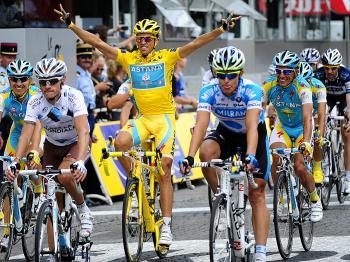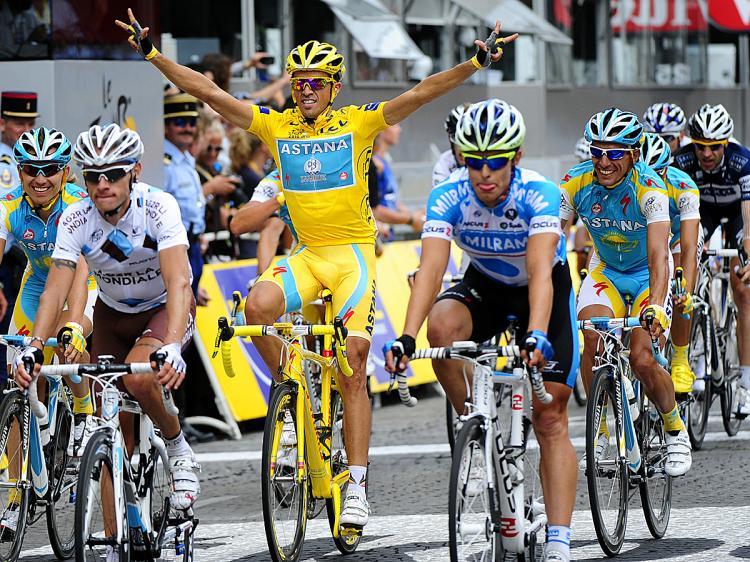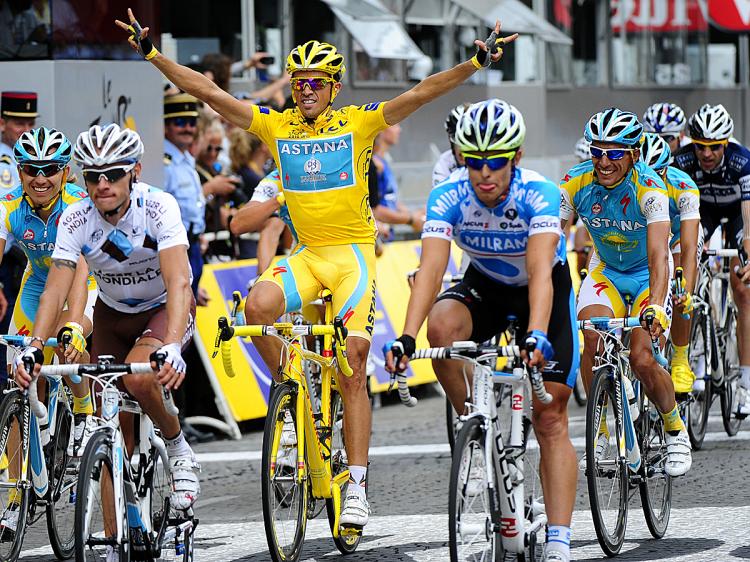Alberto Contador won his third Tour de France on Sunday, by only 39 seconds in a Tour full of crashes, controversy, open combat, and some of the best cycling competition imaginable.
Contador showed that he is still the best cyclist in the world, while Andy Schleck showed that Contador is only the best by a slim margin.
“It is a Tour in which I had a lot of pressure, especially physically, as I was not at my best level,” Contador told LeTour.fr. “It took a lot of confidence to face difficult situations.
“For example, everyone said I had already won the Tour after the stage to the Tourmalet. But we saw yesterday, in the race against the clock, that it was not fully played out.
“Today is therefore a great relief for me, it is a moment that I feel like I’ve been liberated from all the pressure.”
Cavendish Wins Sprint, Petacchi Wins Green
The final stage of the Tour de France is an honorary procession for the General Classification winners. No one attacks the winners; if they have managed to survive 20 stages of suffering through the valleys and mountains, the winners deserve an easy road to Paris.
Once in the city, the race for the stage win begins, in eight circuits of a seven-kilometer route around downtown Paris, finishing up with a final sprint up the Champs Elysées.
HTC-Columbia’s Mark Cavendish won the sprint, his fifth stage win of the 2010 Tour, while Lampre’s Alessandro Petacchi won the green jersey.
“I came around the last corner and I just jumped and started my sprint,” Cavendish tolf LeTour.fr.
“It’s different on the Champs-Elysées to every other sprint in the Tour de France where you kind of have save as much energy as possible because every day is so hard. In Paris you’ve got nothing to save your energy for so you just go all-out to the line and that’s kind of what I did today.”
Coming onto the final stage of the race, eight laps of a 7-km route around downtown Paris, riders started attacking immediately. A breakaway of 11 riders stayed away until the final lap; the peoloton reached speeds of 65 kph running down the escape, exhausting some of the best leadout riders.There was too much competition in the final kilometers for any teams to line up a clean leadout. Coming into the final kilometer-and-a-half, Lampre, Garmin, and Cervelo fought for supremacy, and all fragmented.
Cervelo’s Brett Lancaster led Thor Hushovd into the final half-kilometer, with Alessandro Petacchi on Hushovd’s wheel. Next in line were Mark Cavendish and Garmin’s Julian Dean, stripped of their support.
Petacchi launched left as Hushovd started his sprint, while Cavendish exploded down the right side, leaving everyone else ten meters behind. Petacchi held on for second, while Julian Dean took third.
“I’m disappointed this year not to win the green jersey,“ Cavendish said. ”I set out to do so—it was a target for this year.
“I had some bad luck in the first days and was out of the running but the team fought back, did our best and I lost it by 11 points. But we won five stages and we’ve got to be happy with this year’s Tour.”
Radio Shack Wears Livestrong
Before the race proper began, Team Radio Shack flirted with disqualification.
Radio Shack’s riders came to the line wearing black #28 jerseys, signifying 28 million people living with cancer. Lance Armstrong races to publicize the Livestrong Foundation, dedicated to fighting cancer and helping cancer patients and survivors.
Before the start, UCI (International Cycling Union) officials demanded they wear their official red Radio Shack jerseys. The race referee stopped the race to give the team time to change.
Radio Shack won the team GC by 9:15 over Caisse d’Epargne. Despite not having anyone high in the GC (Chris Horner finished 10th, Levi Leipheimer and Andreas Kloden 13th and 14th) the race was a success for Radio Shack, and huge success for Lance Armstrong’s Livestrong foundation.
Alberto Contador: Three-Time Winner
Alberto Contador’s first Tour victory came as a result of the disqualification of Rabobank’s Michael Rasmussen for violating training rules. Contador, riding for Discovery, won a mountain stage that year.
Contador joined Team Astana in 2008, but the team was not invited 2008 Tour de France because of drug use by former team members. Contador won the Giro d’Italia and Vuelta d’Espagne that year, and was named the best cyclist in the world by a panel of journalists, for the second straight year.
In 2009, the Spanish rider, still riding for Astana, demonstrated his ability by beating Lance Armstrong and Andy Schleck to win his second Tour de France, this one unmarred by official controversy—though there was much controversy over his relationship with Lance Armstrong.
Contador won one mountain stage, the team time trial and the individual time trial in 2009, finishing 4:11 ahead of second-place Andy Schleck.
This year Alberto Contador became one of the very few Tour winners never to capture a stage, though he quite probably could have won stage 17, had he not given it to Andy Schleck in a gracious gesture.
“The three wins are all very different,” Contador explained.
“The first, in 2007, had something special, precisely because that was the first. Last year, the context was difficult and this made it difficult. And this year I have had difficult moments, but I could count on a strong team.
“I realize that each year I gain in experience. I now better manage a team throughout the race.
“Now I am happy to enjoy this victory and I’ll take a good vacation.”
Alberto Contador is still one of the best cyclists in the world. This year, however, he showed that advantage is shrinking.
Andy Schleck: Twice Runner-Up
Saxo-Bank’s Andy Schleck once again finished on the second step of the podium, wearing the white jersey of Best Young Rider, and wanting the yellow.
After losing by 4:11 last year, Schleck cut that margin to only 39 seconds in 2010, against the same opponent, Alberto Contador.
Contador is at his peak as a rider; and Andy Schleck is fast approaching that peak. Three years younger, Schleck has just developed the skills that Contador has already perfected. Even so, the Luxebourger nearly dethroned his Spanish rival.
“I am not disappointed,’ Andy Schleck toold Versus-TV before the stage. “I won two stages, so it is ‘Mission Accomplished” for the whole team. I am sad because the adventure is over.
“I gave it everything. In the end, I didn’t win but, it’s been a great tour. I am already ahead for next year.”
After the race, Schleck said, “It’s a completely different feeling to when I came second in 2009. I got up there [on the podium] and saw the yellow jersey and realized I was so close—but in the end it’s so far away.
“I almost had it. I wore yellow for six days and I’m more than sure that I want to do better. I have a meeting on the Champs-Elysées next year with the yellow jersey. I’ll be back to win it.”
Crashes, Combat, Controversy in the Mountains
The 2010 Tour de France was visited by unusual circumstances from the first stage.
In Stage 1, three major crashes held up most of the field. The second, a pile-up of riders three deep across the whole road, kept two-thirds of the peloton form contesting the finish.
Stage 2 saw even worse carnage, as a particularly slick stretch of road coming down from the Col de Stockeu claimed 80 riders, including all the GC favorites. All were able to continue, but others were not so lucky. Garmin-Transitions lost leader Christian Vande Velde and Tyler Farrar broke his wrist which forced him to drop out later.
Stage 3 featured seven stretches of cobblestones , which claimed bikes and riders. Lance Armstrong, already sore from Stage Two, lost time here, first for getting stuck behind the crash of Frank Schleck (which ended his Tour) and then for a flat tire, as the team car couldn’t reach him.
Stage 6 saw Katusha sprinter Robbie McEwen flattened by a Tour official immediately after crossing the finish line. Luckily the Australian rider was able to continue.
Meanwhile another Australian, World Champion Cadel Evans, went from wearing yellow to barely hanging on after breaking his elbow in a crash in Stage 8. Twice a runner-up in the Tour, Evans looked to be a possible upset victor this year before fate struck him down.
Stage 8 also marked the end of seven-time–winner Lance Armstrong’s hopes for a final Tour victory . Already behind because of crashes and mechanical failures, Armstrong crashed three times in this stage, losing so much time to the leaders it was plainly impossible to make up. Sore and suffering, Armstrong crossed the line knowing he was no longer Radio Shack’s team leader.
Stage 11 saw a confluence of combat and cycling, as HTC-Columbia’s leadout rider Mark Renshaw, trying to make space for the team’s sprinter mark Cavendish, head-butted Garmin’s Julian Dean three times in the final several hundred meters, before blocking Garmin sprinter Tyler Farrar. Renshaw was disqualified from the Tour.
Stage 14 saw the first head-to-head battle between Alberto Contador and Andy Schleck in the mountains, which ended up a draw—the first hint that Contador might have a serious rival.
Andy Schleck made his decisive move in Stage 15—and was immediately hamstrung by a dropped chain. Post-race analysis shows that Schleck himself was at fault, shifting his chain at too sharp an angle while under the strain of climbing.
Albeto Contador, who had already started accelerating, went right past Schleck, which caused some controversy; many thought it was wrong to take advantage. This was Schleck’s best chance to gain time on Contador; of course, Contador might have caught him anyway. Afterwards Contador apologized to Schleck, and in the end, this stage was not decisive.
Lance Armstrong made his final bid for Tour de France glory in Stage 16, attacking at kilometer Zero and staying away the length of the race. In the end, he did not have the energy to contest the sprint; his gamble to at least take a stage win didn’t pay off, but Armstrong’s effort thrilled his fans and showed that he still had the will of a champion.
“It’s been a tough three weeks—I think it’s been a tougher Tour than all of us expected,” Armstrong told Versus. “It’s certainly been tougher for me with the breaks that I had. No regrets. I wanted to do better, for sure, but I was proud to stay in there and finish.
“From the perspective of Livestrong, it was better than our wildest imaginations could ever have predicted or dreamed. We were able to affect the lives of millions of people with affected by this disease. It’s all worth it.”
Stage 17, the Reine de la Tapa, or hardest stage of the Tour, pitted the two best climbers in the sport—Alberto Contador and Andy Schleck—head-to-head for the stage and overall wins. This was Andy Schleck’s last chance to win, and Contador’s last chance to lose.
The pair were evenly matched. Schleck could not drop Contador, but neither would he be dropped. Instead of selecting a winner, Stage Seventeen assured that the whole Tour would depend on the Stage 19 time trial.
Stage 19 was deemed to be Contador’s stage. Andy Schleck had never done well in a time trial against international competition, while Contador had won a dozen major time trials—including the one in 2009 which gave him the Tour win.
Andy Schleck had said he wouldn’t give up, and he didn’t. In fact, for the first third, Schleck gained time on Contador, throwing quite a scare into the Spanish fans. But in the end, Alberto Contador proved the stronger rider, though only by a few dozen seconds.
The final stage is a formality. The only contest was the race for the green Best Sprinter jersey, which featured three of the best sprinters in the world: HTC’s Mark Cavendish, Cervelo’s Thor Hushovd, and Lampre’s Alessandro Petacchi.
Cavendish won the sprint, with Petacchi finishing third and winning the green jersey.
It was the fifth stage win opf the 2010 Tour for Cavendish, the 15th of his career.






